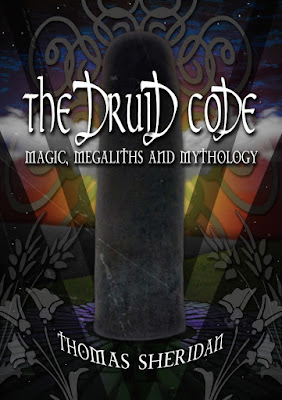Review: Turbine Syndrome by Tommie Kelly
Tommie Kelly's Turbine Syndrome is described by the author as "a magic
ritual, dressed up as a soap opera, the goal of which is to end the world as we
know it."
Ominous, indeed!
However, as
with any work produced by such an experienced magical practitioner and artist,
it's probably worth contemplating the meaning of such a description from
various perspectives.
Alan Watts wrote that waking up to who you are requires you to let go of who
you imagine yourself to be, and, certainly, this seems to be the character
journey of the protagonists in Turbine Syndrome.
As with many of the greatest and most profound journeys, a guide may appear to
offer advice, commentary, or even to mock our attempts to untangle our distractions
and illusions as we set out on our path.
We meet such a messenger at the beginning of this story: the symbolism and art
offering a few different interpretations of how such a figure has manifested
over time and traditions.
This is a
work of magic in itself, after all, so surface impressions may belie a deeper
undercurrent of meaning.
One of the
main themes, for me, at least, and hinted in the artwork, is the concept of
repetition and cycles, and how seemingly negative circumstances can often become
the catalyst for change, or at least the opportunity for change: these moments
are represented within Turbine Syndrome as both mundane obstructions within
'ordinary' life, as well as profound psychological walls through, or over which,
our protagonists must find a way past.
The events take place in a town called Liminal Quay, which may or may not be a
magical location in itself with ancient stones next to, perhaps, more recent
portals set up as triggering devices for changes in outlook and attitude.
Our characters navigate their opening narratives with both cynicism and a
desperate hope to overcome this outlook at the same time.
Much like most magicians, I dare say.
The whole work is a resonant spell, almost humming and crackling with thought
and ideas, which is why it definitely requires more than one reading.
I'm sure I missed quite a few nods and allusions to philosophies and magical
concepts and at the same time I felt an almost subliminal and unconscious
connection to the trajectory of this story.
Of course, you can't really approach or contemplate the most profound questions
and causes for existential despair without a dark sense of humour, and the
characters in Turbine Syndrome have a weary scepticism about themselves and
their idealism throughout the work. Or, I should say, their struggle to
discover and protect that tiny, dim spark of idealism which seems to be their
North Star of redemption within the swirling maelstrom of life and
circumstances which they are mired within for now.
Turbine Syndrome is a deep work concerning the themes of healing, forgiveness,
and dare I say banishing, in a way.
For any return to authenticity these are the hardest steps to take but also
lead to further mirrors and reflections, selves and lost aspects of self.
I'm eagerly awaiting the next volume.
Highly recommended.
Purchase Link.
.png)


Comments
Post a Comment